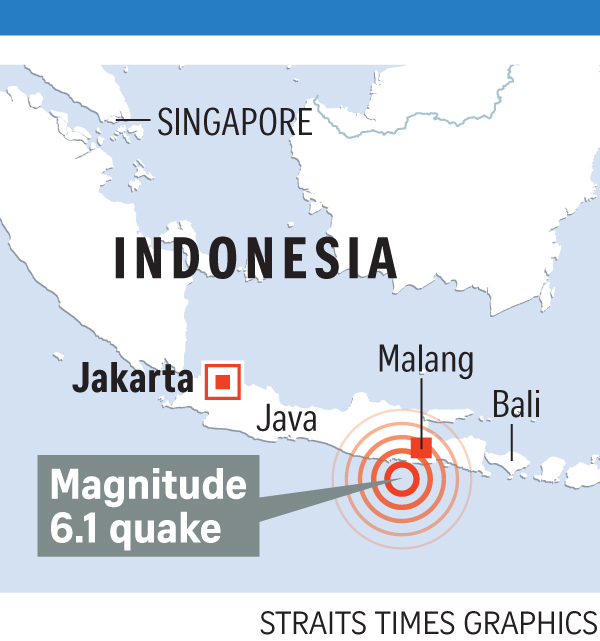East Java residents face aftershocks after quake kills eight
39 injured and nearly 1,200 homes damaged; 150 public facilities, including hospitals, hit
Sign up now: Get insights on Asia's fast-moving developments
Some residents across Indonesia's East Java province spent a second evening yesterday in public halls, temporary shelters, verandas and tents following a deadly quake that rocked Java Island on Saturday.
At least eight people were killed and 39 others injured after a magnitude 6.1 earthquake hit at 2pm local time (3pm Singapore time), the National Disaster Management Agency (BNPB) said yesterday.
The epicentre of the underwater quake, which lasted 37 seconds, was located 90km south-west of Malang regency at a depth of 25km, but the quake did not trigger a tsunami, according to Indonesia's Meteorology, Climatology and Geophysical Agency (BMKG).
During her visit to the affected areas in Malang regency yesterday, East Java Governor Khofifah Indar Parawansa said village halls could serve as the best alternative for evacuees. Those evacuating from the earthquake had to deal with the trauma, and spacious places were required, she added.
President Joko Widodo yesterday ordered swift rescue and relief efforts. "I have ordered... immediate emergency response to search and find victims under the rubble and to treat the wounded, as well as handle the (impact of) the earthquake," the President said in broadcast remarks.
Eight aftershocks of magnitude 3.1 to 5.3 were recorded as at yesterday morning by BMKG.
The eighth aftershock was also felt in neighbouring Central Java and Yogyakarta provinces, local media reported.
Five people died in Lumajang regency, while three were killed in Malang, BNPB spokesman Raditya Jati said yesterday. Of the 39 injured, three had serious injuries.
The quake affected at least 1,189 homes, of which 85 were severely damaged, and 150 public facilities, including schools, hospitals and places of worship, across 15 regencies and cities in East Java, BNPB said.
Local disaster management agencies have set up command posts to bring services to the affected residents, such as communal kitchens and shelters.
On Saturday, BMKG had warned residents living in earthquake-affected regions of flash floods and landslides.
"Following the earthquake, slopes have become unstable. If it rains in those areas, it could potentially break apart," BMKG chief Dwikorita Karnawati said.
Torrential rain, triggered by tropical cyclone Seroja, caused flash floods and subsequent landslides in East Nusa Tenggara province and neighbouring West Nusa Tenggara on April 3 and 4.
Professor Dwikorita noted that a magnitude 4.1 earthquake had rocked East Nusa Tenggara one day before heavy rain hit the province.

At least 174 people were killed and 48 people were still missing in the province as at Saturday. The disaster also claimed two lives in West Nusa Tenggara.
Sitting in the Pacific "Ring of Fire", Indonesia experiences frequent seismic and volcanic activity, including earthquakes, which are sometimes followed by tsunamis.
A magnitude 6.2 earthquake struck Sulawesi Island in January, killing more than 100 people.


